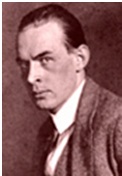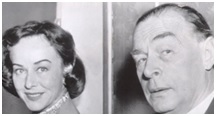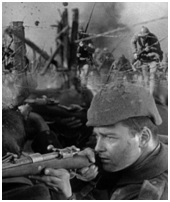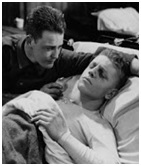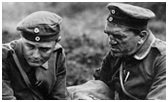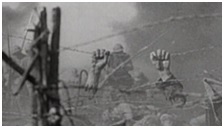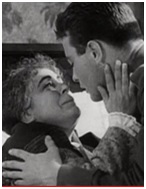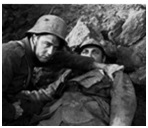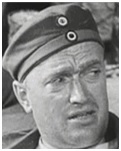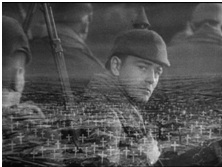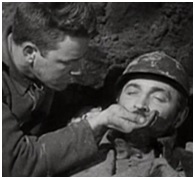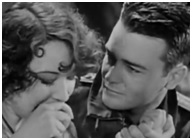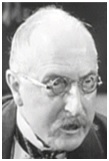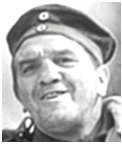|
 |
|
 |
All Quiet on the Western Front - War and Leadership
All Quiet on the Western Front (1928)
Written by the German, Erich Remarque, (1898 -1970) The first German edition is pictured right. Set during the First World War in 1917-8 in the German trenches, where he was badly wounded. Fun facts
Key characters Paul Bäumer, the novel’s hero and narrator. Kantorek, his schoolmaster. Corporal Himmelstoss, responsible for his army training. Kat (Stanislaus Katczinsky) , his best friend in the army. Albert Kropp, another good friend.
The story (all pictures taken from the 1930 film) Inspired by the patriotic speeches of their teacher, Kantorek, nineteen-year-old Paul Bäumer (pictured right) ,and several of his friends, join the army to fight in France on the Western Front in the First World War. But they are soon disillusioned after ten weeks of brutal training by the cruel, ex-postman, Corporal Himmelstross, and the horrors of war.
Paul visits his former classmate Kemmerich who is dying from gangerene (pictured right). Paul isn’t critical of his other old classmate, Müller, who wants Kemmerich’s boots because he will no longer need them. Paul observes that survival in war depends on disconnecting yourself from emotions like grief, sympathy and fear. Soon afterwards Paul witnesses the death of Kemmerich who gives his boots to Müller.
Paul’s friend, Kat (pictured right below together), says that, if officers were given the
same food and pay as everybody else, wars would be over quickly. Another of Paul’s classmates, Albert Kropp, wants to abolish armies and instead make a nation’s leaders settle their disagreements with wooden clubs. The soldiers observe that insignificant people become powerful and arrogant during war like Corporal Himmelstross, but, when he joins the fighting, he becomes more sympathetic to the men. At night, the men have the harrowing experience of laying barbed wire whilst being bombarded by artillery. The
surviving men return to base camp, killing lice and thinking about what they will do after the war. But all of them fear that it will never end, and Paul worries that he wouldn’t know what to do with himself, if it did.
A terrible battle (pictured right) kills many of Paul’s comrades in which men are blown apart and huge rats pick at the dead and wounded. Paul feels that he must become an animal in battle instinctively driven only by the need for survival. Afterwards he and his friends have a swim and then meet some French girls . He desperately wants to re-capture some innocence and intimacy with a girl but cannot do so. On leave Paul goes home to see his family. He can’t share his horrible war experiences with anyone, not even his mother (pictured right together), whom he learns is dying of cancer. But he gets cold satisfaction from hearing that the patriotic Kantorek has been conscripted as a soldier. He visits Kemmerich’s mother and dishonestly tells her that his death was instant and painless. At the end of his leave he stays at a training camp near a group of Russian prisoners of war. He thinks they are people just like him and wonders how war can make people kill each other without any grudge between them. Paul returns to the war and his friends. They are disappointed to find that the Kaiser,
the German leader, is a short man with a weak voice, when he visits the front.
In battle, Paul is forced to hide in a shell hole, and a French soldier jumps in with him. Paul instinctively stabs him, giving him a slow, painful death. He is filled with remorse, feeling that the Frenchman is no enemy but a victim of war like himself (pictured right). He discovers that he was Gérard Duval and that he had a wife and child. When Paul returns to his trench, his friends try to console him. The next battle injures Paul and Kropp. Paul has surgery (followed by a short leave at home) and
Kropp becomes extremely depressed after having his leg
amputated. Paul’s friends are then all killed including Kat who has his head sliced open by shrapnel. Ex-farmer, Detering (pictured right), misses home so much that he deserts and is shot. Paul, now alone, is poisoned in a gas attack and given a short leave. He thinks that his life in peacetime will be ruined because all he knows is war. In October 1918, one month before the end of the war, Paul is killed. On that day there is little fighting, prompting an army report to say: “All quiet on the Western Front”. Paul’s face has a sad, calm expression (pictured right), as if relieved that his death has finally come.
Lessons for life
1. War is horrible Paul’s life is ruined by war which turns him into a “human animal”. He:
The irony is that his death comes when there is little fighting and it is “all quiet on the Western Front”.
2. Life without love isn’t worth living Once the war has destroyed his friends and feelings of love and humanity,
Paul feels that a life in peacetime would be worthless. War destroys his relationship with his family (being unable to share his horrible experiences) A French girl also refuses to give him the innocent intimacy that he longs for (pictured right).
4. Patriotism is pernicious Paul and his friends are tempted to enlist by their patriotic teacher, Kantorek (pictured right), and so endure the war’s pointless butchery. Detering is shot for desertion, only because he puts his family first and is desperate to see them.
5. Be pragmatic Paul reluctantly accepts Müller’s practical (and seemingly morbid) desire to take the dying Kemmerich’s boots.
6. Bad leaders demoralize people Ordinary soldiers like Paul, are annoyed that their officers and arrogant leader, the Kaiser (Wilhelm II, pictured right), have an unjustifiably privileged position. Kat (pictured right below) observes that the war would be over quickly, if they had the same food and
pay.
Key quotes on war All quiet on the Western Front, from the army report on the day Paul was killed. We have lost all feeling for one another, Paul A word of command has made these silent figures our enemies; a word of command might transform them into our friends, Paul on the Russian prisoners. Forgive me, comrade...how could you be my enemy? If we threw away these rifles and this uniform you could be my brother just like Kat and Albert, Paul speaking to the French soldier, Duval, he has just killed. The war has ruined us for everything, Albert. This dying man ...has an invisible dagger with which he stabs me: Time and my thoughts, Paul
Key quote on change Our thoughts are clay, they are moulded with the changes of the days, Paul
Key quote on death Death is not an adventure to those who stand face to face with it.
Two literature websites to recommend 1. sparknotes.com 2. litcharts.com
|
|
|
||
|
|
|
||
|
||
| Copyright © wisdomtowin.com All Rights Reserved | ||
|


